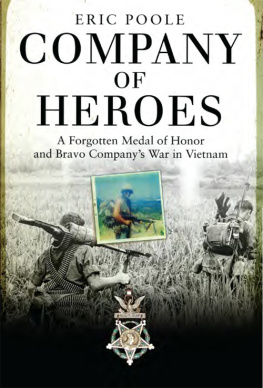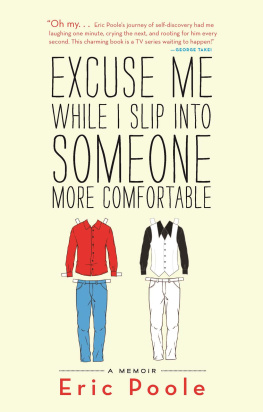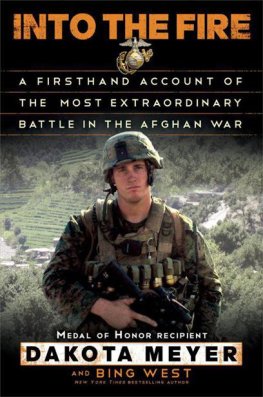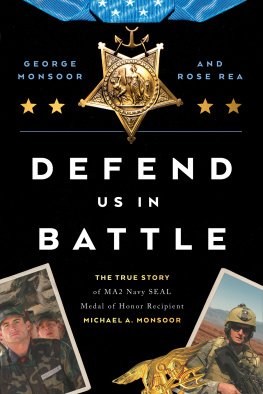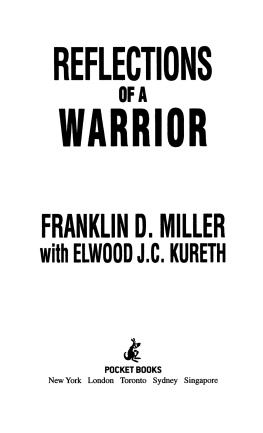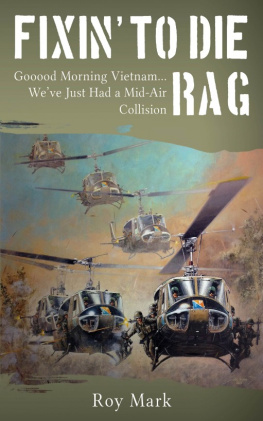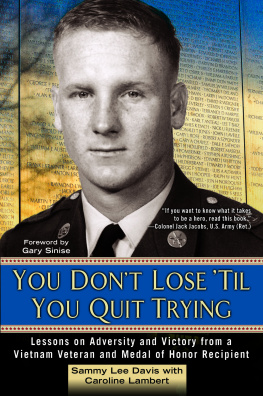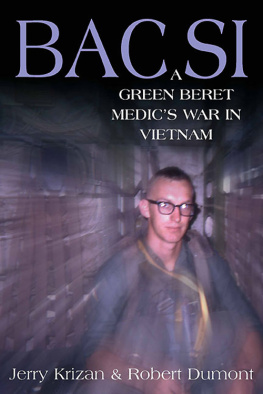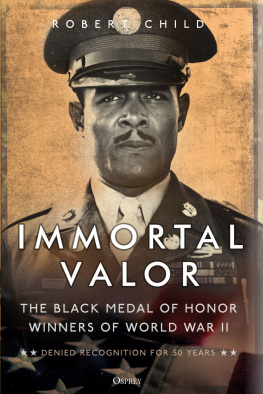COMPANY OF HEROES

E RIC P OOLE
COMPANY OF HEROES
A Forgotten Medal of Honor and Bravo Companys War in Vietnam
CONTENTS
This book is dedicated to all veterans of the Vietnam War, but especially to the men of Bravo Company, 3rd Battalion, 506th Infantry Regiment, 101st Airborne Division (196970) and the following:
KIA January 28, 1970
Steven Hungry Dile, of Chambersburg, Pennsylvania
Peter Guzman, of Los Angeles
Frank Madrid, of Puerto de Luna, New Mexico
and John Shaffer, of Syracuse, New York
KIA February 17, 1970
Joe Honan, of Scranton, Pennsylvania
KIA February 25, 1970
Alan Johnson, of Medford, Massachusetts (died of wounds sustained on February 17, 1970)
KIA April 4, 1970
Gary Weekley, of Middlebourne, West Virginia
KIA April 8, 1970
Richard Calderon, of Silverbell, Arizona
Thomas Scarboro, of Asheville, North Carolina
KIA April 27, 1970
Bobby Koehler, of Philadelphia
KIA May 10, 1970
Larry DeBoer, of Grand Rapids, Michigan
James DeBrew, of Whitakers, North Carolina
Fred Harms, of Bartonville, Illinois
Thomas Merriman, of Paulding, Ohio
Ernie Moore, of Spring Lake, Michigan
Leslie Sabo Jr., of Ellwood City, Pennsylvania
Donald Smith, of Rantoul, Illinois
and Leslie Joe Wilbanks, of Gila Bend, Arizona
In the Jungles of Vietnam
(To the tune of Yellow Submarine)
Lyrics by G. Koziol, music by P. McCartney
In the land where I was born
Men were free to live their lives
To work all week and go to church
To raise their kids and kiss their wives
And then it came, right out of the blue,
We had to go to fight a war
So off we flew to a faraway land
And so we became this very tight band
(CHORUS)
We all lived in the jungles of Vietnam
The jungles of Vietnam, the jungles of Vietnam
We all lived in the jungles of Vietnam
The jungles of Vietnam, the jungles of Vietnam
And we fought, each day and night
It wasnt pretty; it was a horrible sight
We fought together for our fathers and mothers
We fought together, a band of brothers
We were young and tough and free
We were the men from Bravo Company
(CHORUS)
And then we came home from that faraway land
And we hoped to see a marching band
But what we got were protests and hate
No one knew the price that was paid,
Freedoms not free, you got to fight
And so we did, each day and night
And now we are back together again
Reunited, you and me
Because we are still the fighting men
Of Bravo Company
(CHORUS)
ACKNOWLEDGMENTS
In nearly 20 years as a newspaper reporter and columnist, I have received more than 30 regional, statewide and national journalism awards. I dont say that to brag at least, not entirely but to say that the greatest professional honor anyone has ever bestowed upon me has come from the Vietnam veterans who have called me brother in gratitude for my work covering their efforts to see their fallen comrade, Leslie H. Sabo Jr., receive the honor he earned so many years earlier.
Admittedly, that makes me a little uneasy. These were men who fought, bled, and watched their comrades die for one another and their country. Many of the veterans I wrote about in this book are alive today only because Sabo and others leapt, figuratively, into their graves. I, on the other hand, turned ten years old the month that helicopters rescued the last refugees from Saigons rooftops, and my greatest worry in the world was that the Pittsburgh Penguins would blow a three-games-to-none lead against the New York Islanders in the 1975 Stanley Cup quarterfinals.
It still overwhelms me that the men who served during 196970 in Bravo Company, 3rd Battalion, 506th Infantry Regiment, 101st Airborne Division heirs and bearers to the much storied Currahee tradition trusted me with the account that I told, starting with several reports in the Ellwood City Ledger, Sabos hometown newspaper, and culminating with this book. I will be forever grateful to them for that trust. Without it I could never have told their story.
And I appreciate not only the trust of the men who sacrificed so much for our country and for one another but also their acceptance of me, a functionary of the dirty, rotten, stinking news media. Many Vietnam veterans feel hard done by the media, both in its news and entertainment forms, and not without reason. Vietnam was the first war in which the home front received wholly unfiltered reports from the battlefield. As a result, Americans who had been sheltered from the brutality of war behind the natural obstacles of two oceans and sanitized written accounts by the likes of Ernie Pyle had that horrific reality dumped into their living rooms every day by television and newspapers. The World War II image of American soldiers as Knights Templar was replaced by the baby killer Vietnam image.
Neither version was entirely accurate. Many US troops looted their way across Europe in 1944 and 1945, and one Currahee officer, as chronicled in Stephen Ambroses book, Band of Brothers, was rumored to have gunned down more than a dozen captured German troops. Meanwhile, the majority of Vietnam veterans served with honor, just as their World War II forebears did. To an extent, the Bravo Company veterans had little choice but to trust me. Their hope was that Sabo would receive the US militarys highest award for combat valor. And at the time, I was the only reporter looking to tell Sabos story.
Ellwood City, Pennsylvania, where Leslie Sabo grew up, is one of those small towns where you might not know everybody else, but youre rarely more than one degree of separation from everyone else in town. Charlotte Price was my connection to the Sabos. Her son, Doug, is a Pennsylvania state trooper who raises bison on his farm just outside of town and was my sons youth baseball coach one year. Dougs wife, Karen, has had exercise classes with my wife. So, when Charlotte told me that she had a friend who turned out to be Rose Sabo Brown whose deceased husband was being considered for a military award I was determined to follow up on it. The result of that was Act of Courage, which was published April 9, 2007, in the Ellwood City Ledger. That story received a first-place award in 2008 from the Pennsylvania Newspapers Association.
And it earned an even more significant prize from the men of Bravo Company. Because they decided I got their story right with my initial reports, many of them decided to reveal additional, and sometimes harrowing, parts of their stories, both while they were in Vietnam and after they returned home. Im thankful to all of them for their service and for their openness in telling me about their experiences. Im hopeful that this book does honor to them and to all Vietnam veterans who got no credit for their accomplishments and too much blame for the failures of others.
And if Leslie Sabos surviving comrades suffered after he left them behind, so did his surviving family members. Rose Sabo Brown, Leslies widow, was generous beyond what I had any right to expect with sharing her late husbands story. I was by her side when she received word that Leslie would be awarded the nations most prestigious military award and she saw fit to include me in the list of people permitted to witness the eventual White House ceremony. Im thankful for that as well.
When Leslie Sabo arrived in the United States at the age of two, he had an older brother, George, as his only friend. George Sabo, who traces his family lineage back hundreds of years to Hungarian nobility, talked with me about his brother until he could bear the pain of remembering no longer. But he was appreciative enough of my work to offer me thanks before some of the most prominent people in the United States. I thank you too, George.
Next page
